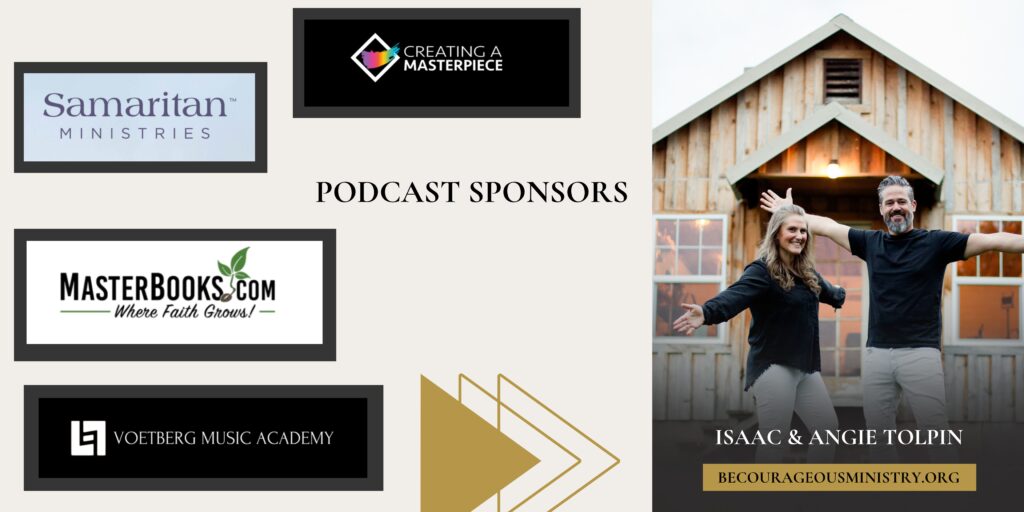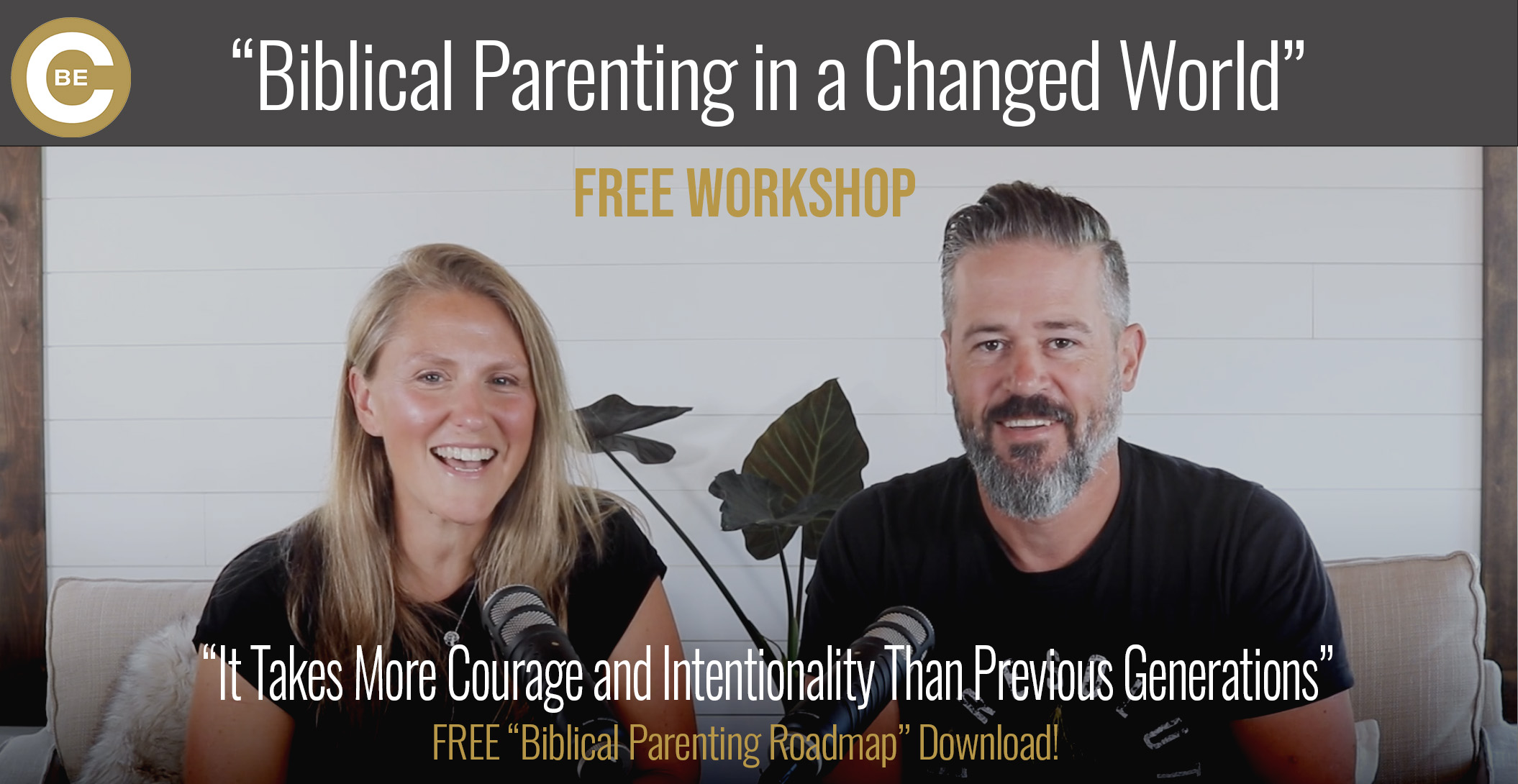Don’t let your reflections of the year discourage you but instead propel you forward. As parents we’re leaders in our homes and a vital aspect of leadership is to always be growing. What are the ways you plan to grow this year? Those will have a direct impact on your family. But to get the ONE THING make sure you watch or listen to the episode.
Main Points in This Episode:
- Make sure your home is relationship focused rather than legalistic
- If you are a task master mostly focused on the to do list, you might be cultivating a legalistic home culture.
- Your personal development boosts your energy for all that you are doing, make sure your growth is a priority.
- Think about ONE THING you can focus on that will make the largest difference on all the areas of improvement you desire for yourself and your family. (Listen to the episode for what we believe the best ONE THING is)
Our Incredible Sponsors Mentioned in This Episode
Master Books
-
Join the Masterbooks Giveaway and you might receive some of our favorite curriculums
Samaritan Ministries
- This is what the Tolpin’s use instead of health insurance, hear why
Creating A Masterpiece
Vooetberg Music Academy
Register today! Includes 13-page roadmap download
Scriptures From This Episode:
– Proverbs 15:1-4 – “A soft answer turns away wrath, but a harsh word stirs up anger. The tongue of the wise commends knowledge, but the mouths of fools pour out folly. The eyes of the Lord are in every place, keeping watch on the evil and the good. A gentle tongue is a tree of life, but perverseness in it breaks the spirit.“
– Hebrews 12:15 – “See to it that no one fails to obtain the grace of God; that no “root of bitterness” springs up and causes trouble, and by it many become defiled;“
– Ephesians 4:22-32 – “To put off your old self, which belongs to your former manner of life and is corrupt through deceitful desires, and to be renewed in the spirit of your minds, and to put on the new self, created after the likeness of God in true righteousness and holiness. Therefore, having put away falsehood, let each one of you speak the truth with his neighbor, for we are members one of another. Be angry and do not sin; do not let the sun go down on your anger, and give no opportunity to the devil. Let the thief no longer steal, but rather let him labor, doing honest work with his own hands, so that he may have something to share with anyone in need. Let no corrupting talk come out of your mouths, but only such as is good for building up, as fits the occasion, that it may give grace to those who hear. And do not grieve the Holy Spirit of God, by whom you were sealed for the day of redemption. Let all bitterness and wrath and anger and clamor and slander be put away from you, along with all malice. Be kind to one another, tenderhearted, forgiving one another, as God in Christ forgave you.”
BE COURAGEOUS app
Freedom of Speech app for Christians
- Private Group for Christian Moms with weekly lives with Angie Tolpin
- Weekly podcast Q&A with episode behind the scenes content. Just type in your question!
- Exclusive biblical resources such as the Courageous Marriage and Redeeming Childbirth series.
- Exclusive access to the courageous kid’s podcast. Play it for your kids to stir up good discussions.
- Monthly LIVE Q&A with the Tolpins; ask the anything.
- Powerful Biblically minded community.
- Topic-based discussion groups.
- You get your own profile and can connect with others.
- Growing libraries of LIVE replays
All Ministry Resources: becourageousministry.org
Our Courses
- Parenting Mentor Program, self-paced online program that equips you to biblically parent during unprecedented times.
- The Homeschooling Blueprint, the online program to boost your effectiveness & help your kids thrive.
- Postpartum Course, The First-Ever Christian Postpartum Course.
- Cultivating Biblical Friendships The course that helps women build lasting Godly friendships.
Financial Gift
- Financial Giving, is important to support our family and expand the impact of the ministry. We aim to impact 10 million legacies. We are in full-time ministry as a large family, so everything makes a difference.
Thank you for being part of this movement to equip 10 million families and their legacies with Biblical truth to raise confident Christian kids in an uncertain world.
Full Transcript:
Note: This is an automated transcript and misspells or grammar errors may be present.
Welcome to Courageous Parenting Podcast, a weekly show to equip parents with biblical truth on raising confident Christian kids in an uncertain world.
Hi, I’m Angie from Courageous.
Mom and Isaac from Resolute Man Together pursuing the mission to impact 10 million families and their legacies for the Kingdom of God.
We’ve been married for 23 years and are seeing the fruit from raising our nine children biblically. Based on the raw truth found in the Bible.
We can no longer let the culture win the hearts of children, as too many from Christian families are walking away from their faith by the age 18. And it doesn’t have to be this way. It shouldn’t be this way.
We’re praising the Lord that the ministry continues to expand and impact more legacies. We couldn’t do this without you. Whether you pray for us, give us five star reviews, or share on social.
Or even if you purchase courses and merch or join the Be Courageous app community, enjoy the coffee or support financially. We’re so thankful you are a big part of the 10 Million Legacies movement.
If you want access to all the episodes, show notes, and other biblically based resources, go to Be Courageous Ministry.
Org. Join us as we start another important conversation about effective parenting in a fallen world. Welcome to the show.
Hey, guys.
Good to see you here. If you’re on YouTube. If not, you’re listening. Wonderful. We have an interesting topic today. It’s about growth. Growth is important. And but spiritual growth is of utmost importance.
Yeah. So we are recording this on Monday. Right. And New Year’s Day is in two days. So it’s January 2025 is coming up in just a couple of days. And we know that at the beginning of the year, people just start thinking about ways that they want to grow. They start making goals, initiatives, resolutions. What are other words that you think of when you think of?
I don’t know, but we’re going to share some candid stories and insights. Some of our things we’re thinking about might spur you on. Yeah, I think that that could be an interesting topic.
You know, I, I also think that there’s this element of reality, since we’re all human and we all live in the world, it’s easy for all of us To start making goals, or to start thinking of the worldly or fleshly things that we would want to grow in, right? Um, to have goals on like, oh, I want to grow my business to a certain level or oh, I want. And those things aren’t bad. It’s just are you are you, though, really taking to heart what God cares about most, which is our personal growth, right? He wants us to have a contrite heart before him to evaluate all of our relationships, because it’s those things that are eternal.
You know, it’s interesting. I love that you said that, because what I’ve experienced is that they go together, that when you’re focused on your personal development, everything else tends to grow. I can think back to the business world when I was doing very well and I realized, you know, I’m the lid on this thing because I’m the leader. And so I went on Saturdays and got coach training at a seminary. And, um, just. I felt like I was already coaching my people. But when I learned that, I’m like, oh, there’s a whole nother level to coaching somebody to excellence implemented that. And that was one of the many things that catalyzed double double results in a pretty sizable company at the time. So I think that, um, that’s so important, like focusing on how we need to grow.
How we need to grow. And because it does change everything else. Yeah. We have an interesting verse to open it up with. Actually, um, I want to take you guys to James chapter four for a second. When I read this scripture, you may not think to yourself, oh, this is a scripture that goes along with the idea of goal setting or what you’re looking forward to this year. But bear with me here for a second. It says in James chapter four, verse six through eight, but he gives more grace. Therefore it says, God opposes the proud, but gives grace to the humble. Submit yourselves therefore to God. Resist the devil, and he will flee from you. Draw near to God and he will draw near to you. Cleanse your hands, you sinners, and purify your hearts, you double minded. And then it just continues on. Humble. I really love this one. Humble yourselves before the Lord and he will exalt you.
I love that because it says, draw near to God. He wants relationship with us most importantly. And but.
We can’t. What’s interesting about this scripture is that he gives us things that we do. We have to take responsibility for humbling ourselves before God. We actually our sin and our pride separates us from him. We can’t draw near to him when we have sin. So he tells us here, humble yourself because he says, God opposes the proud. You can’t draw near to someone who’s opposing you, right? And so if if God opposes the proud, then for us as believers, we we need to ask ourselves, am I actually walking with the Lord with a humble heart posture? And if I’m not, I need to humble myself to be able to draw near, to be able to hear his his will for my life. Right?
What’s one of the greatest reasons your child, as they get older, will cause distance from you? One of the greatest reasons is they have hidden mistakes. Sins that they’re fearful to tell you that they’re holding on to or continuing to do. And that creates distance between you and them, and you don’t even realize what’s going on. Now, of course, God’s all all knowing. So he does know what’s going on, but you’re pulling back what God is there. Now, if you would just submit, if you just submit your life further to submit these things. Surrender. I want relationship with draw. Draw close to me. He’s right there wanting relationship. And as you make your lists, of course I highly encourage. Don’t just make the terrible list first. Make the good list first. About this year. You got to talk about all the things, all God’s blessings, all the ways he showed up, all the things, and make a list of all God’s provision. We should be thankful for everything. You might be in tough situation right now, but it doesn’t mean God didn’t show up in all kinds of ways this year, and we don’t want to forget those things, and that tempers us. So then we can talk about the Terrible’s. I mean, not really Terrible’s, but the things you want to improve, the.
Realities, the realities, the sinful nature issues. You know, I as we were just talking about how like even your children, because this is a parenting podcast. And so if you have struggles in your relationships with some of your kids, I know I’ve been evaluating my relationships this year. I wrote an Instagram post about some of that last night. I started out because I’m I’m deciding and I just want to give you guys permission that you can you can do this too. I’m kind of choosing to do something strange. I’m not picking one word like, you see everybody out there? My one word for this year.
Some people do that.
It’s fine. And it’s totally great. That’s awesome. But I can’t pick just one because I have conviction in my heart about picking more than that. And some of my things are going to be a phrase like slow down and things like that, because I know what God wants from me and I know I’ve been praying about for weeks now. Lord, I know you want this for me, but what is it that I need to focus on doing in order for that to happen? Because it’s not always that thing. Wanting a better relationship or wanting this, or wanting like it’s not always that thing that you need to focus on in order for that to happen. Usually there’s some kind of blockage that is occurring that’s preventing that thing from happening. Right. And so for me, it’s like I’m realizing that I need to simplify some things, pull back from some things, say no to some things, make my life a little bit easier so that I can slow down so I can actually have rest because I don’t feel rested a lot. And, um, and I feel so, so if if that relates to you, my advice is go ahead and pick two words. Slow down, go ahead and pick. You know, pick multiple phrases for different things that you believe God’s laying on your heart. There’s no equation to this. But what there is, is there is a God who loves you, who wants what’s best for you, and his best for you.
Isn’t always having a nicer car, or a cleaner house or or whatever in your head you might be struggling with what his will for you is that he would have a deeper relationship with you, that you would know him more, that you would be walking in the purpose that he created you for. And that takes time to be in the word. It takes time to pursue God and to know him. And if you have relationship issues with your kids like Isaac was just talking about, it reminds me of First John chapter one, where it literally challenges believers. You have this epistle challenging believers. In verse six it says, if we say we have fellowship with him, meaning God, while we walk in darkness, we lie and do not practice the truth. But if we walk in the light as he is in the light, we have fellowship with one another, and the blood of Jesus His son cleanses us from all sin. And then it just continues on. You know, if we say we have no sin, we deceive ourselves. And so I guess I’m bringing this scripture up because if there is a relationship struggle, you can’t change the other person, but you can look into your own heart and search your heart to see if there is any sin that you need to repent of. And maybe that’s the thing that you need to focus on this year.
Well, I like what you said because, you know, a lot of times people are making lists and things about what to improve as long as they made a list about the blessings first, right? So you’re making that list, and then you look over that list and you go, okay, what’s one thing that will impact everything? And the one thing is drawing closer to God. Yeah, that one thing will change everything. It tempers the words you use. It helps you be bold and courageous in the right timing. It helps you to get over these consistent mistakes you keep making. It helps your relationships. It helps everything when you draw closer to God, because when you draw closer to him, you’re becoming a little bit more like him. And that’s the key. And so it’s not that you shouldn’t shoot for, you know, business goals, financial goals, all those things. I think those are really good and awesome and.
You enjoy them.
I enjoy that.
But.
But what what is the biggest catalyst to all those things is you walking in the Lord’s will. That’s what’s most important. You walking in the Lord’s will and and and being trustworthy. Um, because in Luke uh, 1610 it says one who is faithful and very little is also faithful in much. One who is dishonest in very little is also dishonest in much. And so, you know, we want to be faithful in the little things. And if we’re growing and becoming more like God, he can trust us more with bigger things. But if he can’t trust us with bigger things, he might give you might get some of those things because things just work in this world, but they might be causing havoc on your life that you don’t even realize. Like maybe, you know, not spending enough time of that quantity. Time with your children.
Mhm.
So Isaac, when it comes to writing things down, you’ve often shared just from your leadership background, you’ve shared about the importance of writing things down. And this morning when we started preparing for today, immediately you were like in Habakkuk, we gotta get that verse from Habakkuk in chapter two. And so I’m going to just read it for you. And then I’d love for you to kind of share with people about the importance.
Of, before we go into that, why don’t you share a little bit about master books for a second? Oh yeah. And we’ll go into that.
Yeah, sure. So this year, you know, it’s 2025 and it’s the start of a new year. It’s halfway through the school year. And a lot of times people are evaluating what they’ve been experiencing with their curriculum for the last six months. Right. Or the last five months, the first semester of the school year. And for me, we started using a new curriculum called Master Books. You can find out about it. Master Books.com. Forward slash. Courageous. Ahem. And we started using them. I had never used them before, and I have just been super impressed. Now, when I say we haven’t used them before, I mean, I haven’t used a full fledged curriculum that was for one grade level from them for any of my kids. We have used tons of books that they publish because they’re the main publisher of Ken Ham Answers in Genesis and all of their creation scientists materials, which is just that for me, was like the hands down. I didn’t realize that, okay, I’m in like, that actually was the thing that made me excited to try master books. And I will say, it’s been a really great year to be independent, not needing to be a part of a co-op that’s actually saved me a lot of time. You know, you just heard me talking about my need to slow down and being able to say no to some things that are going to be busy things.
And co-ops can be great in different seasons of your life. Yeah, you’ve done that a lot. I’ve done them for many years. Over ten years. Yeah. But, um, but if you’re in a season where maybe you have just had a baby or you’re postpartum or you’ve moved or whatever it is, and you’re just trying to settle and transition, thinking about what is best and having solid relationships in your family. Sometimes you have to cut out things like that that are busy, go go go. And so I’ve really appreciated being able to make sure that my kids are meeting all of their standards. But at the same time, we have this this very high end curriculum that I know is biblically, theologically sound because it’s vetted by many different, um, pastoral, um, protectors of the doctrine, I guess is the best way to say that. And so if that’s something that you’re interested in, and also I just want to mention that they have more than just curriculum. Not only do they have like over 30 different science curriculums to choose from, which is rad. They also have books on things like like the last book that we talked about, woke injustice, which is just.
Think about it’s your trustworthy library or bookstore? Yeah. Trustworthy bookstore. What’s the.
Url? It’s master Books.com. Forward slash. Courageous. Yeah. Okay.
Habakkuk.
You’re gonna read that? Yeah. So in Habakkuk, we have chapter two, verses one through three. It says and so actually I’m going to read at the very beginning it says, I will take my stand at my watch post and station myself on my tower and look out to see what he will say to me. Okay. So this is showing someone literally being purposeful. They’re going up to their watchtower, they’re sitting at their desk or whatever it is, and they’re waiting for the Lord to tell them what to do. So I want to encourage you during this time. I know that for myself as a mom, maybe it’s different for Isaac because he works from home and sometimes he can get stuff done with the kids running around him. I have a harder time with that. So setting aside a time where I can go and be with the Lord at like a a watch post, if you will, where I can station myself there and look out to see what the Lord’s going to say to me. I can be in the word, I can pray. And what? That’s just a powerful thing, to have some quiet time. So it continues on and says, and look out to see what he will say to me and what I will answer concerning my complaint. Sometimes we have complaints. I know that for myself, that’s what I’m doing. I’m evaluating some of my relationships, and I have some things that I’m like, not happy with. And so those would be complaints in a sense, and taking them to the Lord.
Some of the biggest challenges I’ve ever had to deal with were just so perplexing. How in the world are we going to solve this? And, um, I would do that. I would go to a quiet place, I’d open my journal and I would problem solve. And even in situations where I have professionals helping me that are really talented at this, I’m like, no God speaking to me. I’m going to problem solve in my journal, and then I’m going to influence those professionals. And I can look back and I can say, if I wasn’t doing that and influencing the professionals, the outcomes would not have been as good. And I think that that there’s a lot to it.
There’s a lot to it. So let’s continue on. Verse two says, and the Lord answered me while he was there in the quiet. Not with other people. The Lord answered me, write the vision. Make it plain on tablets so he may run. Who reads it? For still the vision awaits its appointed time. It hastens to the end. It will not lie. If it seems slow, wait for it. It will surely come. It will not delay. So there’s there’s a lot in here, you know, obviously the second verse is write the vision, make it plain on tablets so he may run. Who reads it. Yeah.
That’s so important. Is writing things down. Something happens to our brains when we actually write things down. It makes it more concrete, more meaningful, more real. We’re more likely to do it even if we never look at what we wrote down again. It is so powerful, the cognitive processing in writing. So I don’t know all the science behind it, but I know God’s smart and he designed us to have pencils for a reason. So let’s use them. Let’s use them. Use anything. You use a crayon if you want, but just write stuff. Write things down and it’s so satisfying. There’s also a truth to if you’re a person that has things circling in their mind all the time like, oh, I need to do this, and I need to do that, and oh, this problem out here and this problem over here, I wish we could do this. And if you’re one of those people that can’t get to sleep because you’re constantly circling all these things, if you were to write down those things into action plans or even just writing out the issues and the problems, you would find that less and less. It keeps circling in your brain because you now have a trustworthy source called your journal, where you put it down so you no longer have to rely on your brain to keep cycling. All this, and use up all your energy and brain power and cause anxiety. Even now, you can write things out, and you’re more likely to take good actions when you do that and get. And then it leaves room in your mind for new thoughts, for creative thoughts, for exciting things, for, you know, positive things.
Mhm.
You know, the only other time. Well not only one other very powerful time that I remember God referring to writing things on tablets is actually the Ten Commandments in Exodus chapters 19 and 20. And when you look over that experience, it’s like, well, why? Why did God chisel, in a sense, with fire, the Ten Commandments, the law into stone? Well, stone is not I mean, it’s not going to go anywhere, right? If something’s called a permanent.
Journal, it’s.
A permanent journal. But there’s something powerful that it’s like, people are not going to forget these if they’re written down and they’re right here, there’s not going to be misinterpretation of any of the commandments, right where it’s like, imagine if someone was to say, um, thou shalt not steal. Oh, except for if you’re starving like people can. People do that? God knows that. They adjust things to to fit their own needs and desires, to justify their own sin. And he’s not having it, so he writes them down on the Ten Commandments, right? And God’s telling us he’s giving us this exercise, this wisdom in the book of Habakkuk. And if we really want to make progress and grow in a certain area, or we’re convicted about something that we want to change in our life or an area that we want to grow in. I think even even the positive things, let’s say you had a successful business year, but you want more success. That’s not a bad thing, but you have to, like you said, you were the cap to your own growth. So as leaders, you always have to look at yourself and say, I’m the problem. What is the problem? Where am I holding growth back? Yeah. And so it.
Reminds me, if you’re not happy with the atmosphere of your home, guess what? You have to change something within you.
Yeah, actually, that’s one of the latest posts that you put on. Well, that we put on Courageous Parenting’s Instagram. Right. And it’s like, hey, if you don’t like the family culture, you need to change something, right? If you don’t like the atmosphere in your home, you need to change something. Or or you need it. Just enlist. Tools that are going to help you. If you can’t do it. And you need to lead yourself. Because I’ll be honest, there are times as a mom I have to lead my own heart where I get bogged down, like if I wake up and immediately I have kids. Me me me me me. It’s hard for me to stay positive and to be happy and not cranky and to. You know what I mean? Like, I have to remember. No, I have to lead this. I’m going to let them start over. They’re going to go into their room, and I need to get my mind right and become the leader. Give the gift of music this holiday season with Wartburg Music Academy’s gift card. Christmas Special. Instead of learning music in isolation, Wartburg Music Academy.com encourages families to learn together. In fact, with my Code Courageous, you can get 20% off all your children learning piano, guitar, mandolin, violin and ukulele for less than $30 a month.
Say goodbye to budgeting hundreds of dollars a month for just one child to take lessons. On top of that, students are given accountability, performance opportunities, seasonal challenges like the December Jingle Jam challenge, live feedback from their instructor, and printables to help them stay on track. The Vote Berg method approaches music a little bit differently. Instead of teaching theory, note reading, and tedious technical skills. First, they skip straight to giving students a love for music so that they can’t wait to sit down and practice with by ear training and song based learning, students will see immediate results. They can earn visual reminders of their hard work with the vote Berg methods rank system that mails badges and rank pins right to your doorstep. Use my code courageous to get 20% off every month your family is enrolled. Go visit vote Berg music Academy.com. Hey there, we just wanted to invite you to join us in the next Parenting Mentor program, where we talk more about the heart of parenting in session two. So take a listen to this next little clip and we hope you join us.
Steve and I realized that we were getting too comfortable with the world’s vision of how to raise our children.
What Angie and Isaac have done in creating this is literally phenomenal.
This program provided awesome scripture based teachings and just some really great practical applications.
This class has just really rocked my world.
It has given me a vision for not just the different things that we might focus on as parents who are trying to raise our kids biblically, like how our kids are behaving or what we’re doing with discipline, but also the things of the heart.
We now have a game plan to how we want to raise our children. We have so many answers to the questions that have been in our mind.
It’s not just these hypothetical situations or it’s not just this. Here’s what I think you should do. It’s let me show you where in Scripture this is, do.
Your legacy a favor and your self a favor and just do it.
One of the best things that we’ve done this year, one of the best investments we’ve made this year. And I could not recommend it more.
We’re no longer fearing dark days ahead, but we’re so excited to raise lights to be leaders for the next generation.
Well, starting the.
Day you just hit on an important topic which has to do with this stuff is maybe that’s part of your growth plan, which is starting the day correctly. I think it’s less about what time in the morning you actually start your day, and it’s the purpose at which you start your day. Yeah, everybody has different cycle seasons, uh, responsibilities, things going on. So just to say everybody needs to start at this time super early in the morning isn’t the answer. No. But what is the answer is to start well and starting well is starting with the Word of God. Do you have a little bit of time? I mean, that’s convicting for me, you know, is to start, right? I need to improve. I’ve had times where I start really well. I start my family really well and that sometimes things get get busy, get off track. And so we have to recalibrate, you know, are you starting the day yourself with the Bible and are you starting with your family with the Bible? I think you do that one thing in 2025. That one thing will change. So much will trump everything else on your list, I guarantee it.
Yeah, it’s a big game changer when we don’t start our day with God altogether. We’re not the same family. The atmosphere in our home is not the same. Literally, it’s the hardest thing for me to lead in the home, because managing the home, that’s my jurisdiction as a woman. During the day, I’m in charge of my home, in the household and managing it right. And as keepers of the home managers of the home, we if we’re not being filled with the Holy Spirit and being reminded of the truth, then we are operating in our flesh. You know what.
Happens when you operate in your flesh? You become a legalistic home. Legalistic home versus a relationship home. What do you want? Well, God wants relationship. Church is supposed to be relationship based, not legalistic. Rules based. Yeah. Uh, it’s it’s, you know, are there certain protocols with church? Absolutely. Are certain protocols with your home? Absolutely. But the the heart of the matter is what we’re talking about. Yes. And if your heart is, I can do it my way or the highway. Here’s what’s going to happen. Then you’re going to come down as kind of a taskmaster parent. And but if your relationship, if the heart of it is improving and growing relationships within your home and you and your children and you and your spouse, then that is going to yield far more fruit and actually you’re going to get way more done. See, there’s two ways to get things done. You can get things done through, you know, because you’re more powerful and you can tell people what to do and they’ll go do it. And there is a time for that as a parent. Absolutely. But if you’re more of a heart based, relationship based culture in your home and from your leadership, then you start to more often have people doing things because they want you, because they see that you’re doing too much, because they want to follow through and say, mom, look what I did, versus I don’t want to do that.
Yeah, you know what it reminds me of? It reminds me of this week, when we had our kids at our house for Christmas, and I was so blessed. Like, I want to cry. I was so blessed by Caroline and Austin. Yeah. Um, because they took on two meals. I know that’s such a little thing, but it’s actually not when you have, um, 14 to 16 people that you’re feeding every meal for many days in a row. And, you know, I have a lot of sons. And so they, you know, they’ll cook when they need to, but it’s not their jam. They’re not going to be wives and kitchen. I’m not raising house men. Right. I’m not. Yes. They know how to cook some things. Yeah. And I have really been encouraged with some of the boys who’ve come to me and said, mom, will you teach me how to cook some things? Because I need to be having better food with me than peanut butter and jelly when I go to work. And I’m like, yes, they finally asked, right? Because you can push and you can tell your kids what to do, or you can wait for them to come to you and want that. And that’s much more meaningful. And you actually it’s better. It reminds me.
Of the cow, right? That old analogy of, you know, the boy trying to push on the cow. Push on the cow. I can’t get it to move at all. And then he puts his finger in the calf’s mouth and leads it out.
Right? Yeah. It’s so different. Or milk or something. Right? Exactly. And so, you know, I kind of went a little too far with that, that analogy. Just because I do want to share with you guys, you know, it is important to to teach men how to cook. Teach your boys how to cook. It is important. Um, I don’t want to seem really heavy on one side of that, but what I was trying to say is that I was really blessed relationally by Caroline and Austin because she was like, mom, did you have something planned for lunch on this day, or can I take that meal from you and I? I was shocked, so blessed. And I immediately was like, yes, please, that’s awesome. And I was so excited to and I my countenance started to change that day because I wasn’t I didn’t have it in my mind, oh, at this time I have to start doing this and this and this and this and this. Instead, I got to sit on the sofa, read a book to the grandkids and to the littles, and I got to have a little bit of a break during the holiday time that we were having with family. I even played a game, a new game with one of the boys, two of the boys, and it just it was really sweet. And then the next morning, then Austin’s like, hey, can I make breakfast? I have these special protein pancakes that we make. They were really good and they were really, really good. But like, again, it was one of those days he’s like, yeah, no, how about you sleep in mom? And I’m like, oh my, I can’t. Who is like I just that really, really blessed me. And it wasn’t something I asked for a blessing. It wasn’t something I asked for, but it was because I know it was just because he loves me. Yeah. And he was just. He figured out the way to tell me that, and it really meant a lot. So sorry, I didn’t know I was going to cry. It was really special.
That’s two episodes in a row you’ve cried. Now, is this going to be a reoccurring theme?
I hope not. Oh, okay. Well, I just did want to share something with you guys. Um, as we’re nearing the end of the podcast here, we’re talking about the importance of evaluating the real heart thing. What does God care about most? We all know he cares about our hearts. He cares that we are growing in him. In spiritual maturity, we see Paul exhorting the churches, saying, hey, there was a time when it was okay for you to have spiritual milk. Now it’s time for you to grow up and start having spiritual meat. And as parents, as older believers, we have a responsibility to push ourselves to grow spiritually, actually. And so when we read scriptures that are so common today, like Galatians 522 and 23 that talk about the fruits of the spirit. Yeah, you were just talking about the fruit. I just want to list them off here for you guys. But before I do, I want to read something because it goes along with what you were saying in chapter five, verse 16. It says, but I say, walk by the spirit, and you will not gratify the desires of the flesh. Whoa! So when you’re goal setting, it’s not about desiring or gratifying the desires of the flesh when you’re walking by the spirit.
It’s not about that. It’s not about gratifying the desires of the flesh. For the desires of the flesh are against the spirit, and the desires of the spirit are against the flesh. For these are opposed to each other to keep you from doing the things you want to do. And so here’s the deal. Whatever the desires are that you have in your heart, that’s like the first thing is evaluating is this a desire of the spirit or a desire of the flesh? And you have to take that before the Lord with a contrite heart, lay them before him and go, Lord, what’s your will? Not my will. Let your will be done. And I think that so many of us, we we go to our special quiet place with our journal to vision, and we get excited and we think about the possibilities and that’s all great. But are we then taking those before the Lord and going, but is this your will, Lord? Because I only want what you want.
And a danger. Danger if it causes discontentment and what God has given you thinking about making progress, then something’s wrong in your thought process. Yeah, something’s wrong in the heart of all of this, which is we do need to so love and appreciate what God is doing in all the things he is doing. And it’s okay to desire more. But let’s walk strong with the Lord. So we know that we’re hearing from God. We know that we’re the Spirit’s prompting us in the right directions, in his will, and to faithfully, you know, steward the small things well so that he can trust us with more things in this coming year. It’s exciting. What an incredible new year! I love that when the New Year comes around, because, I mean, it’s always a clean slate, but it’s just an opportunity to really think through, you know, how are things going? And then what do I want for my family? What do I want personally? And maybe there’s some dreams that you want to pursue too.
Well, and I think that when we write, I know that for myself, it’s, it’s less about like, it’s less about, um, the growth or the projects, although those are fun things to dream about. And we talked about those in some of the other podcast episodes that we did. We did a three series set, you guys, which I want to just point out and encourage you to go listen to one on Family recalibration. It was actually on November 22nd, and then there was one on, uh, family culture date night, right where the couple goes on a date night and they visioneer together. And then there was another one on how to actually plan the family meeting. And so those things you guys so powerful, you have to go listen to those podcasts after listening. Today’s because you want to teach your kids this method. You are not method. You want to teach them this skill that I really believe. It’s a life skill to dream, to plan, to bring things before the Lord, to pursue growth in different areas. If kids don’t grow up with it, it’s not like they’re going to learn this at school. And so and depending on what their work experiences are, they’re probably not going to learn this in work. So but this is something that helps you to really thrive actually to have something to look forward to growing in every year, regardless of what we’re talking about, if it’s, you know, the business side of things or if it’s a personal side of things, and it’s a really powerful.
It’s so important. Growth is so important because it stirs the energy within you. And if you’re not growing, then your energy might be decreasing in certain areas. And those areas might be really important. So it is important, you know, it’s like when you read a really good book that stimulates your mind and gives you good ideas, Your energy grows. You know, when you write in your journal about, you know, some plans and with detail and so forth, your energy starts to grow. And when your energy grows and your and you’re doing things and growing in good directions, the Lord is a, you know, in his will, right? Then it’s like, wow, everything else you do goes better. And so it’s so important. I think we are. God designed us to be people of progress, to be people that are growing and learning. He gave us minds, you know, in the mind. It’s very interesting thinking about the mind right now. I have a mild concussion from the thing we talked about last week. But yeah. Um, so I’m very keen on the mind right now. I just killed some brain cells. But you didn’t.
Someone else.
Did. Thank you. So. So I’m operating a little slower, so bear with me. But it’s actually proven that connections in the brain, just in a normal state, are either connecting and you’re making more connections in your brain, or they’re actually disconnecting. And so when they’re disconnecting, you know, that means you’re essentially getting smarter. Or you said the word right, so you’re getting smarter or not so smart, stupid or it’s not really a word, but you know what I mean. So so either either of those are happening. So it’s not like you amass knowledge and you grow and you’re growing and you stay with that knowledge. Like you could have a library in somewhere in your house where you’re not going to.
Remember everything you read.
I’ve read all these books, let’s say. Yeah. And, um, and, and now I can stop and just relish in my knowledge. Nope. No, no, that’s not how our brains work. And so we always need to be growing and it gives us energy. It’s such an important thing.
Right.
Well, I do want to just, um, draw attention to a few things as you’re making your list, as you’re praying about what God’s desire for growth is and what his will is for you and your growth this year. One of the things that is easy for us to overlook and go, oh yeah, I know the fruit of the spirit, but the fruit of the spirit is love, joy, peace, patience, kindness, goodness, faithfulness, gentleness, self-control. Against such things there is no law. And those who belong to Christ Jesus have crucified the flesh with its passions and desires. If we live by the spirit, let us also walk by the spirit. Let us not become conceited, provoking one another and envying one another. So, you know, obviously this this scripture, everybody knows it very, very well. But if you were to take the word gentle and evaluate how you speak to certain people in your life, are you gentle? If you were to take the word kind and you could do the same thing, what about love? Are you loving people the way you want to love them or the way you feel most loved? Or are you thinking about them and loving them the way they want to be loved? When you think about joy, like these are things that come by the spirit being in your life. And so, like Isaac said at the very beginning of this podcast, if you focus on your relationship with God, he changes you. This is called the fruit of the spirit for a reason. This is not something that we can conjure up in our own flesh.
Yes, you can learn to be self-disciplined as a human being. And you can be clean and be disciplined at cleaning up your messes after yourself. But that doesn’t mean that you have the fruit of the spirit of self-control. There may be rage inside your heart and in your mind and in your soul. And so I bring this up because as you go through each of these joy, peace, patience, kindness, goodness, faithfulness, faithfulness, are you faithful to God first and foremost? Are you faith? Are you a faithful friend? Is that what people would say about you? Like, what is the character qualities and the virtuous things that God wants for his children? What do we have to grow in because we never arrive? And the last verse that I want to share with you guys is in Second Peter. But you know, I wanted to encourage you that for me this year, I’m kind of going about my word and my list a little bit differently because I’m thinking about character qualities, and I’m thinking about how when you get older, it’s easy to just rest in your laurels and not necessarily think, oh, I need to become better at, I don’t know, being more loving. But I think that imagine how different this world would be if even older people in their 50s, 60s and 70s recognized I haven’t arrived. And what fruit of the spirit, what virtuous character quality do I need to grow in? How that would change the way that we operate with one another?
That’s a warning right there. If you if you have a character issue, which I think all of us do at times, right. We have problems. We’re sinful. Um, but if there’s something in your life, it’s kind of like a rut in the road. And if you allow that, stay as you get older. Unfortunately, sometimes you see that rut just get deeper until they die and you don’t want to be like that. And we want to catch ourselves and get out of that rut, um, and grow out of out of those issues.
So second Peter chapter one, verse five through eight says, for this very reason, make every effort to supplement your faith with virtue. Mhm. That’s interesting. Right. Supplement I have Isaac on a bunch of supplements right now for the concussion to help him heal. And here’s God’s Word telling us for this very reason. Make every effort not some effort. Make every effort to supplement your faith with virtue and virtue with knowledge. So that means so if you were to put that there, make every effort to supplement virtue with knowledge and knowledge with self-control. Control and self-control with steadfastness, and steadfastness with godliness, and godliness with brotherly affection and brotherly affection with love. For if these qualities are yours and are increasing because they can always increase, they keep you from being ineffective or unfruitful in the knowledge of our Lord Jesus Christ.
That Second Peter one five through eight, maybe jot that down. Maybe make that one of your key verses for your family this year. That’s my verse. That is such. Just take it. You know it’s not Angie’s. It’s the.
It’s God’s. No, I know, but I was I was going to say the reason why I wanted to share this with you is this is actually the this little portion of Scripture. I’m actually focusing on verse three through 15 because it does continue on. It says, for whoever lacks these qualities is so nearsighted that he is blind, having forgotten that he was cleansed from his former sins.
Ouch. Yeah.
It’s like, okay, so we focus on things like the fruit of the spirit, which are good to focus on. But then you’ve got this incredible verse here in Second Peter that’s talking about godliness and steadfastness and virtue and knowledge. And it’s God is saying like supplement your faith with them.
Yeah.
That’s huge. We should not be overlooking this. Instead, we need to look at it and go, okay, that’s convicting. Lord, what would you what words would you have me focus on? And so for me, like this is my verse scripture that I’m going to be going to this year and I’m excited to learn more from it.
Well, we hope this was encouraging to you. If you love it, share. It helps impact more people. Uh, we’re focused on impacting 10 million legacies. We can’t do it without your help. All resources at Be Courageous Ministry. Org, including we have important fundraising initiatives. Would you help us to be able to be courageous in 2025, in a bigger way and get more resources out there? Uh, all over the world. So thanks so much for joining us.
See you next time. Hey, thanks for listening and being a part of the 10 Million Legacies movement. Go to be Courageous Ministry. Org for more biblically based resources, ways to switch where you spend your money that support the mission, and information about the incredible Be Courageous app community for believers.
Also, we wanted to quickly tell you about our six week online Parenting Mentor program.
Isaac and I created a powerful biblical curriculum. Here’s how it works. Each week, we release a video session with a downloadable parenting packet to make it easy for you to incorporate those teachings directly into your parenting.
This is an incredible, self-paced program. We cover everything from tending to their hearts, handling obedience to overcoming mistakes most Christians are making. But more than that, it’s a supportive community. You’ll have access to our private group in the Be Courageous app, live webcast, and direct access to us.
If you’re interested in joining our next online Parenting Mentor program, secure your spot now at Be Courageous Ministry. Org that’s Be Courageous ministry.org.













